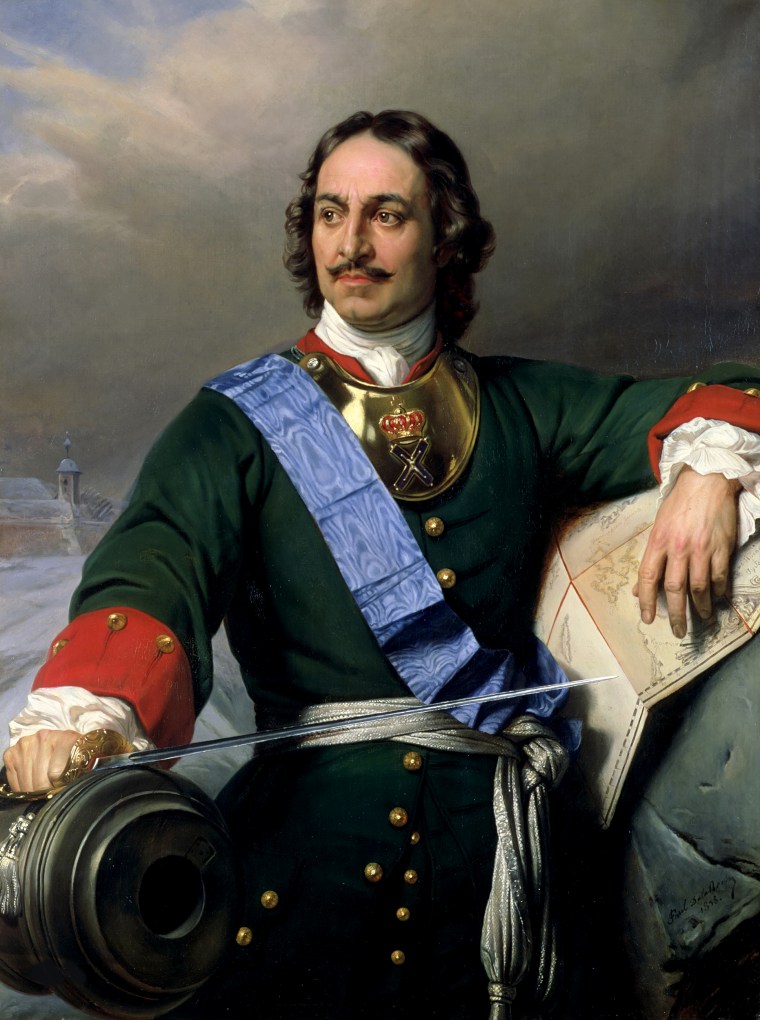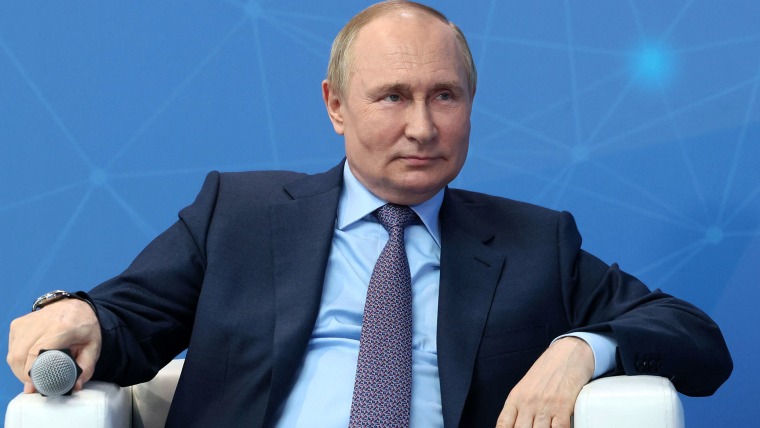Russia-Ukraine war has Putin comparing himself to a tsar. That’s scary.
Even as Russia’s short-term designs for a “victory” in its invasion of Ukraine grow ever more modest amid its military failures, Russian President Vladimir Putin is comparing himself to Peter the Great. The tsar was behind empire-building feats in the 17th and 18th centuries that for the first time made Russia that era’s dominant imperial power in Eastern Europe. He founded Russia’s navy and expanded into the territory of the present-day Baltic states and Sea of Azov while battling Sweden and Turkey.
Peter “did not take anything from them,” Putin said in a speech to Russian entrepreneurs on Thursday about land the tsar conquered from the Swedes. “He returned” this territory to Russia, Putin maintained. “It seems it has also fallen to us to take back and strengthen” territories.

In other words, Putin sees Ukraine, formerly a Soviet Republic with a large Russian-speaking minority, as having been a part of Russia, and thus being Moscow’s to “take back” under its control.
On the one hand, this conception has horrifying implications. By the same rationale, nearly every country at one time occupied and directly administered by Moscow — the Baltic States, Belarus, all the former Soviet republics in Central Asia like Kazakhstan and Armenia and parts of Poland and Romania — could be eligible for “taking back” should Russia deem it necessary to reclaim these “lost territories” too.
To be sure, Russians and Ukrainians have often been intertwined politically and culturally more closely than peoples in other former Soviet republics. But that doesn’t entitle Russia to negate modern-day Ukrainian statehood any more than the U.S. is entitled to occupy Canada because of its past as a British colony.
On the other hand, Putin’s naked ambition is now clear to see. Before Russia’s invasion in February, Putin and other nationalists established that they didn’t believe Ukraine should exist as an independent country, including in an essay Putin himself wrote last year.
But prior to starting the war, the Russian leader also served up red herrings and conspiracy theories to justify his actions: the notion that Ukraine (which has a Jewish president) is overrun by Nazis, that sinister U.S. biolabs were performing nefarious experiments on Ukrainian soil, that Ukraine was waging genocide against ethnically Russian Ukrainians. As these accusations were fundamentally baseless, they never stuck.
But there was another casus belli that some Westerners have embraced: that Russia’s brazen invasion resulted from a fear of NATO expansion and American hegemony in Ukraine. Prominent politicians, former officials and analysts on both the left and right have bought Putin’s argument that the Western alliance’s possible extension into Ukraine is a threat to Russian security — and that the best way to stop the current war is to appease Putin to allay those concerns.
Both John Mearsheimer, the world’s most prominent scholar of so-called realist foreign policy thinking, and former Secretary of State Henry Kissinger, its most legendarily ruthless practitioner, recently made the case that concessions to Putin are needed.
Mearsheimer argued that Western military aid to Ukraine merely eggs Kyiv into fighting, prolonging an essentially unwinnable war (never mind Ukraine’s remarkable battlefield successes and Russia’s jaw-dropping failures). And Kissinger declared that Kyiv’s only hope is to cede territory for peace, giving Putin enough of what he wants so he doesn’t lose face or come under risk of a coup, as happened to Soviet Premier Nikita Khrushchev after withdrawing nuclear missiles from Cuba under pressure from the Kennedy administration.
(It’s true that the U.S. famously felt threatened by Russia’s military presence in what it perceived as its own sphere of influence — Cuba — during the Cuban missile crisis, but in that case the Soviet Union placed nuclear weapons on the island, a far greater danger than any military support the West has given Ukraine.)
Leftist icon Noam Chomsky, too, chides Ukrainian President Vladimir Zelenskyy, saying he needs to “pay attention to the reality of the world” in which resisting such a powerful state is futile. This logic is similar to applauding France’s surrender to the Nazis in World War II in exchange for retaining a shrunken collaborationist regime, while condemning the Polish and Norwegian governments for continuing to fight in exile.
Chomsky, the avowed anti-Imperialist, further argues that Ukrainian requests for arms with which to repel Russia’s invasion are merely “Western propaganda” meant to have Ukrainians “fighting Russia to the last Ukrainian.” We should pause here to consider his staggeringly paternalistic display in dismissing the idea that Ukrainians might genuinely want arms themselves, as well as to wonder why Russia’s imperialism is apparently more tolerable than the West’s.
There is a contrary school of thought expressed by French President Emmanuel Macron and an unsigned New York Times editorial that Ukraine risks trying to win too much if the West doesn’t restrain arms deliveries. The idea is that if Putin’s fragile ego is so bruised by the collapse of his invasion and Ukraine’s recapture of land, he’ll lash out with nukes or something else nasty.
Despite being contradictory, these arguments boil down to the idea that if Putin could claim a partial victory by holding land in eastern Ukraine or preventing Ukraine from joining NATO, the war could be resolved. Unfortunately, Putin’s latest remarks suggest his objectives remain as maximalist as ever.
Putin’s latest statement spells out what should already have been obvious: His is a blatant land grab motivated by revanchist imperialism, not a preemptive attack to forestall NATO accession.
Indeed, Russia is moving ahead with plans to create yet another Russian-controlled puppet republic in southern Ukraine around the occupied city of Kherson via a “referendum” seeking to legitimize its annexation. It’s requiring schools to teach a new Russian curriculum while cutting back Ukrainian-language education, and is also requiring use of Russian currency.
Despite having a majority ethnically Russian populace, residents in these cities have been actively protesting and resisting Russia’s military occupation through civil disobedience, and many have been kidnapped and tortured.
Furthermore, Russia reportedly deported over 1 million Ukrainian civilians to camps in Russia, including over 200,000 children Ukraine claims have been taken from their parents for adoption by Russians. To complete this colonial project, Moscow is sending Russian civilians to the captured territories to run businesses and take over administrative duties and is reportedly stealing vast quantities of grain from Ukrainian territory for export.
This is in keeping with Moscow’s long history of using forced migration and linguistic erasure as tools of imperial expansion at the expense of nations like the Chechens and Tartars — methods we should recognize from the West’s own shameful colonial history.
Putin’s latest statement spells out what should already have been obvious: His is a blatant land grab motivated by revanchist imperialism, not a preemptive attack to forestall NATO accession. After all, with an alarmed Finland and Sweden applying to join NATO due to Putin’s assault on Ukraine, he can’t plausibly argue the invasion improves Russia’s strategic position.
The U.S. and Europe have their own imperialist pasts to atone for, but trying to coerce Kyiv into ceding its territory to Russia is hardly the way to go about it. If Kyiv concedes territories now, it has every reason to expect Russia to try to eat even further into Ukraine in the future.
It should ultimately fall to Ukrainians to determine how to balance diplomatic and military strategies in confronting such a remorseless aggressor, and what compromises it’s willing to offer at the negotiating table. The U.S. should help it do so both because it’s the right thing to do and because it would serve our national security interests by checking Russia’s military aggression before it can strike additional countries — including some the U.S. has pledged by treaty to defend.



